Cinema Ritrovato presented this week Rendez-nous Musidora!, a rich programme focusing on the French mega-star. With her heavily kohled dark eyes, somewhat sinister make-up, pale skin and exotic wardrobes, Musidora (1889-1957) created an unforgettable vamp persona. Musidora is best known for her roles in the Louis Feuillade serials Les Vampires (1915-1916) as Irma Vep (an anagram for ‘vampire’), the voluptuous leader of a gang of criminals, and in Judex (1917) as Marie Verdier. At a time when many women in the film industry were relegated to acting, Musidora also achieved some success as a producer and director. Later she became a journalist and wrote about cinema. This is our final Cinema Ritrovato 2019 post. Arrivederci!

French cigarette card by Cigarettes Le Nil, no. 38. Photo: H. Manuel.
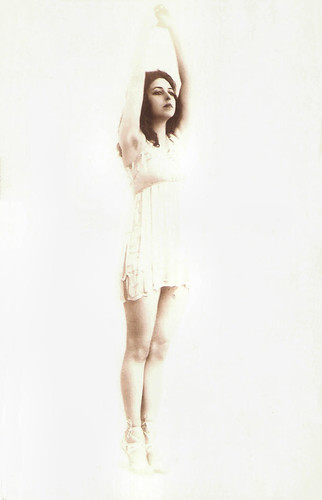
French postcard by Editions Gordon & Cie., Vincennes (Seine).
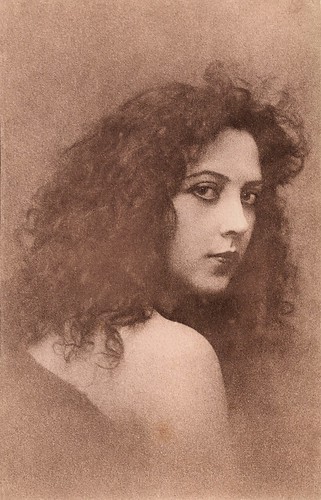
French postcard by Editions Sid, Paris, no. 8039. Photo: G.I. Manuel Frères.
Musidora was born Jeanne Roques in Paris, France in 1889. She was raised by a feminist mother and socialist father.
She began her career in the arts at an early age, writing her first novel at the age of fifteen and acting on the stage with the likes of Colette, one of her lifelong friends. She performed in revues at French music halls and cabarets, such as the Folies Bergère, Concert Mayol, and La Cigale. Jeanne adopted the stage name Musidora (Greek for 'gift of the muses'), after the heroine in Théophile Gautier's novel Fortunio.
She made her film debut already around 1909, but in 1914, she started to appear regularly in short silent films like Les miseres de l'aiguille/The misery of the needle (Raphael Clamour, 1914). She starred in a few silent films by Gaston Ravel, including La bouquetière des Catalans/The Flower Girl of Catalonia (Gaston Ravel, 1914) and Le trophée du Zouave/The Zouave trophy (Gaston Ravel, 1915).
She also began to work with the highly successful film director Louis Feuillade, and appeared in a dozen of his short silent films for Gaumont. These included Severo Torelli (Louis Feuillade, 1914), Tu n'épouseras jamais un avocet/You will never marry a lawyer (Louis Feuillade, 1914) featuring Marcel Lévesque, Le calvaire/The Calvary (Louis Feuillade, 1914) with René Navarre, and Les noces d'argent/Silver Wedding (Louis Feuillade, 1915) with Édouard Mathé.
Musidora then appeared in his hugely successful serial Les Vampires/The Vampires (Louis Feuillade, 1915-1916) as cabaret singer Irma Vep opposite Édouard Mathé as crusading journalist Philippe Guerande.
Musidora’s mystique was accentuated in Les Vampires by her large, dark eyes and wearing a black leotard, hood and tights. Les Vampires was not actually about vampires, but about a criminal gang-cum-secret society inspired by the exploits of the real-life Bonnot Gang.
Irma Vep was adored by the surrealists, who deemed her both an embodiment of cinema itself and the projection of the deepest truth of the time. A modern fairy, a haunting enigma made flesh, night incarnate in her black silk catsuit, a bewitching shadow, the elusive and wild character of Irma Vep, with her dark-eyed gaze and seductive silhouette, made the actress Musidora immortal.
Besides playing a leading role in the Vampires' crimes, Irma Vep also spends two episodes under the hypnotic control of Moreno, a rival criminal who makes her his lover and induces her to assassinate the Grand Vampire. The series used gadgets like poison rings, poison fountain pens, cabinets with fake back panels etc. It was an immediate success with French cinema-goers and ran in 10 installments until 1916.
After the Les Vampires serial, Musidora starred in Judex (Louis Feuillade, 1917), another popular Feuillade serial filmed in 1916 but delayed for release until 1917 because of World War I. Judex is a twelve part serial following the adventures of the masked vigilante Judex (René Cresté) as he fights against criminals led by the corrupt banker Favrauxom. Les Vampires and Judex have been lauded by critics like André Bazin as the birth of avant-garde cinema and cited by filmmakers as Fritz Lang and Luis Buñuel as being extremely influential in their desires to become directors.
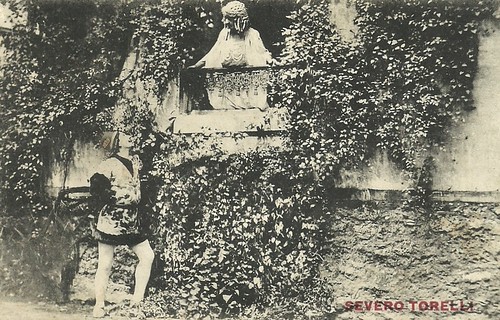
French postcard by Maury's International Attraction Circuit. Photo: publicity still for Severo Torelli (Louis Feuillade, 1914). Severo Torelli was a French silent feature, produced by Gaumont and based on a 1883 play by François Coppée. Fernand Herrmann played the title role and the female lead was for Renée Carl (Dona Pia). Musidora played Portia.
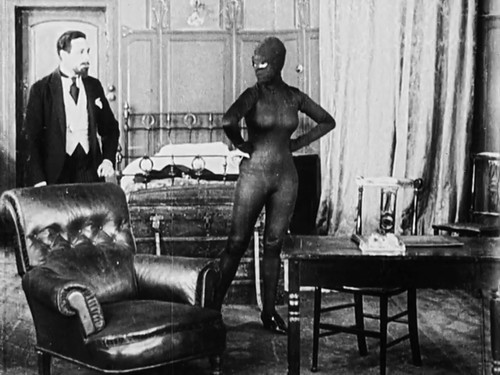
Musidora as Irma Vep in Les Vampires (Louis Feuillade, 1915-1916). Collection: The Island of Cinema @ Flickr.
Musidora also starred in films by other directors, like in Le pied qui étreint (Jacques Feyder, 1916) - a funny send-up of the Feuillade's serials, the silent adventure film Les chacals/The Jackals (André Hugon, 1917), starring André Nox, La jeune fille la plus méritante de France/The most deserving girl of France (Germaine Dulac, 1918), and Mademoiselle Chiffon (André Hugon, 1919), with Suzanne Munte.
Apart from her acting career, she became a film producer and director under the tutelage of her mentor, Louis Feuillade. Her first film was an adaptation of a novel by her friend Colette, La vagabonda/The Vagabond (Musidora, Eugenio Perego, 1918). Between the late 1910s and early 1920s, she directed ten films, all of which are lost with the exception of two: the tragic romance Soleil et ombre/Sol y sombre/Sun and Shadow (Jaime De Lasuen, Musidora, 1922) and La terre des taureaux/La tierra de los toros/The Land of the Bulls (Musidora, 1924), both of which were filmed in Spain, starring the Cordoban mounted bullfighter Antonio Cañero.
In Italy, she produced and directed La Flamme Cachée/The Hidden Flame (Roger Lion, Musidora, 1918) based on another work by Colette. At a time when many women in the film industry were relegated to acting, Musidora achieved a degree of success as a producer and director.
Annette Förster writes in an article at Women Film Pioneers Project: “While her films were favorably reviewed in the press, Musidora as producer reputedly only lost money on them. It remains unclear whether this was due to the terms of her contract, as she claimed in a 1946 interview with Renee Sylvaire, or to the fact that the films failed at the box office.”
Her final film role was as Delilah in the drama Le berceau de dieu/The Cradle of God (Fred LeRoy Granville, 1926) After her career as an actress was over, she focused on writing and producing. Her last film was an homage to her mentor Feuillade entitled La Magique Image/The Magic Image (1950), which she both directed and starred in.
Late in her life she would occasionally work in the ticket booth of the Cinematheque Francaise. Few patrons realised that the older woman in the foyer might be starring in the film they were watching.
At 68, Musidora died in Paris, France in 1957 and was laid to rest in the Cimetière de Bois-le-Roi. Musidora was married to Dr. Clément Marot from 1927 till 1944. The union produced one child, Clément Marot Jr.
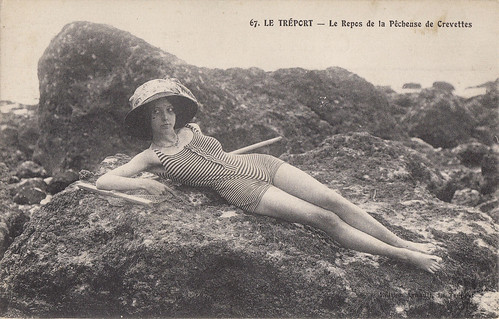
French postcard, no. 67. Caption: Le Tréport - Le Repos de la Pêcheuse de Crevettes. (Le Tréport - The Rest of the Shrimp Fisherwoman). Collection: Marlène Pilaete.
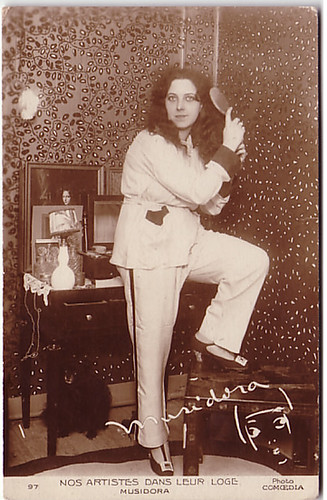
French postcard in the Nos Artistes dans leur loge series. Photo: Comoedia. Collection: Beth Ann Gallagher (Flickr).
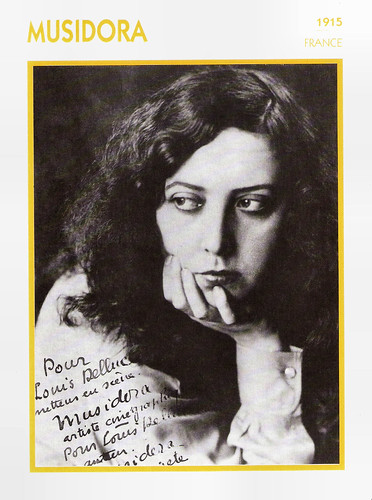
French collectors card in the series 'Portrait de Stars; L'encyclopédie du Cinéma' by Edito Service, 1992. Photo: Collection Cinémathèque Française. Caption: Musidora, 1915, France.
Sources: Annette Förster (Women Film Pioneers Project), Bobb Edwards (Find A Grave), Wikipedia, and IMDb.

French cigarette card by Cigarettes Le Nil, no. 38. Photo: H. Manuel.

French postcard by Editions Gordon & Cie., Vincennes (Seine).

French postcard by Editions Sid, Paris, no. 8039. Photo: G.I. Manuel Frères.
Gift of the Muses
Musidora was born Jeanne Roques in Paris, France in 1889. She was raised by a feminist mother and socialist father.
She began her career in the arts at an early age, writing her first novel at the age of fifteen and acting on the stage with the likes of Colette, one of her lifelong friends. She performed in revues at French music halls and cabarets, such as the Folies Bergère, Concert Mayol, and La Cigale. Jeanne adopted the stage name Musidora (Greek for 'gift of the muses'), after the heroine in Théophile Gautier's novel Fortunio.
She made her film debut already around 1909, but in 1914, she started to appear regularly in short silent films like Les miseres de l'aiguille/The misery of the needle (Raphael Clamour, 1914). She starred in a few silent films by Gaston Ravel, including La bouquetière des Catalans/The Flower Girl of Catalonia (Gaston Ravel, 1914) and Le trophée du Zouave/The Zouave trophy (Gaston Ravel, 1915).
She also began to work with the highly successful film director Louis Feuillade, and appeared in a dozen of his short silent films for Gaumont. These included Severo Torelli (Louis Feuillade, 1914), Tu n'épouseras jamais un avocet/You will never marry a lawyer (Louis Feuillade, 1914) featuring Marcel Lévesque, Le calvaire/The Calvary (Louis Feuillade, 1914) with René Navarre, and Les noces d'argent/Silver Wedding (Louis Feuillade, 1915) with Édouard Mathé.
Musidora then appeared in his hugely successful serial Les Vampires/The Vampires (Louis Feuillade, 1915-1916) as cabaret singer Irma Vep opposite Édouard Mathé as crusading journalist Philippe Guerande.
Musidora’s mystique was accentuated in Les Vampires by her large, dark eyes and wearing a black leotard, hood and tights. Les Vampires was not actually about vampires, but about a criminal gang-cum-secret society inspired by the exploits of the real-life Bonnot Gang.
Irma Vep was adored by the surrealists, who deemed her both an embodiment of cinema itself and the projection of the deepest truth of the time. A modern fairy, a haunting enigma made flesh, night incarnate in her black silk catsuit, a bewitching shadow, the elusive and wild character of Irma Vep, with her dark-eyed gaze and seductive silhouette, made the actress Musidora immortal.
Besides playing a leading role in the Vampires' crimes, Irma Vep also spends two episodes under the hypnotic control of Moreno, a rival criminal who makes her his lover and induces her to assassinate the Grand Vampire. The series used gadgets like poison rings, poison fountain pens, cabinets with fake back panels etc. It was an immediate success with French cinema-goers and ran in 10 installments until 1916.
After the Les Vampires serial, Musidora starred in Judex (Louis Feuillade, 1917), another popular Feuillade serial filmed in 1916 but delayed for release until 1917 because of World War I. Judex is a twelve part serial following the adventures of the masked vigilante Judex (René Cresté) as he fights against criminals led by the corrupt banker Favrauxom. Les Vampires and Judex have been lauded by critics like André Bazin as the birth of avant-garde cinema and cited by filmmakers as Fritz Lang and Luis Buñuel as being extremely influential in their desires to become directors.

French postcard by Maury's International Attraction Circuit. Photo: publicity still for Severo Torelli (Louis Feuillade, 1914). Severo Torelli was a French silent feature, produced by Gaumont and based on a 1883 play by François Coppée. Fernand Herrmann played the title role and the female lead was for Renée Carl (Dona Pia). Musidora played Portia.

Musidora as Irma Vep in Les Vampires (Louis Feuillade, 1915-1916). Collection: The Island of Cinema @ Flickr.
The most deserving girl of France
Musidora also starred in films by other directors, like in Le pied qui étreint (Jacques Feyder, 1916) - a funny send-up of the Feuillade's serials, the silent adventure film Les chacals/The Jackals (André Hugon, 1917), starring André Nox, La jeune fille la plus méritante de France/The most deserving girl of France (Germaine Dulac, 1918), and Mademoiselle Chiffon (André Hugon, 1919), with Suzanne Munte.
Apart from her acting career, she became a film producer and director under the tutelage of her mentor, Louis Feuillade. Her first film was an adaptation of a novel by her friend Colette, La vagabonda/The Vagabond (Musidora, Eugenio Perego, 1918). Between the late 1910s and early 1920s, she directed ten films, all of which are lost with the exception of two: the tragic romance Soleil et ombre/Sol y sombre/Sun and Shadow (Jaime De Lasuen, Musidora, 1922) and La terre des taureaux/La tierra de los toros/The Land of the Bulls (Musidora, 1924), both of which were filmed in Spain, starring the Cordoban mounted bullfighter Antonio Cañero.
In Italy, she produced and directed La Flamme Cachée/The Hidden Flame (Roger Lion, Musidora, 1918) based on another work by Colette. At a time when many women in the film industry were relegated to acting, Musidora achieved a degree of success as a producer and director.
Annette Förster writes in an article at Women Film Pioneers Project: “While her films were favorably reviewed in the press, Musidora as producer reputedly only lost money on them. It remains unclear whether this was due to the terms of her contract, as she claimed in a 1946 interview with Renee Sylvaire, or to the fact that the films failed at the box office.”
Her final film role was as Delilah in the drama Le berceau de dieu/The Cradle of God (Fred LeRoy Granville, 1926) After her career as an actress was over, she focused on writing and producing. Her last film was an homage to her mentor Feuillade entitled La Magique Image/The Magic Image (1950), which she both directed and starred in.
Late in her life she would occasionally work in the ticket booth of the Cinematheque Francaise. Few patrons realised that the older woman in the foyer might be starring in the film they were watching.
At 68, Musidora died in Paris, France in 1957 and was laid to rest in the Cimetière de Bois-le-Roi. Musidora was married to Dr. Clément Marot from 1927 till 1944. The union produced one child, Clément Marot Jr.

French postcard, no. 67. Caption: Le Tréport - Le Repos de la Pêcheuse de Crevettes. (Le Tréport - The Rest of the Shrimp Fisherwoman). Collection: Marlène Pilaete.

French postcard in the Nos Artistes dans leur loge series. Photo: Comoedia. Collection: Beth Ann Gallagher (Flickr).

French collectors card in the series 'Portrait de Stars; L'encyclopédie du Cinéma' by Edito Service, 1992. Photo: Collection Cinémathèque Française. Caption: Musidora, 1915, France.
Sources: Annette Förster (Women Film Pioneers Project), Bobb Edwards (Find A Grave), Wikipedia, and IMDb.
1 comment:
What an extraordinary woman. She would have loved living in today's world. Lovely post, my Friend.
Post a Comment